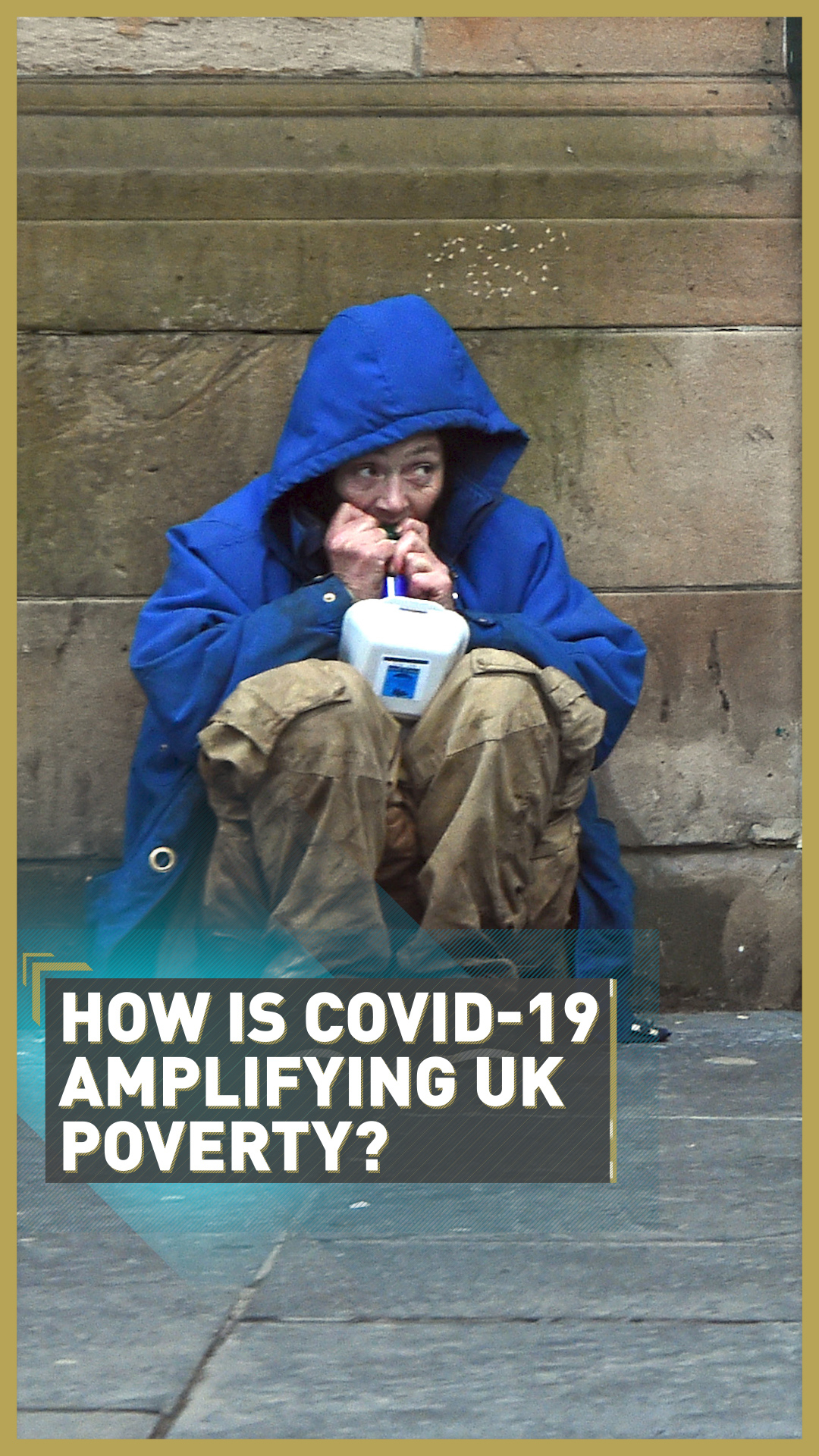- Home
- China
- World
- Europe
- Politics
- Business
- Opinions
- Tech & Sci
- Culture
- Sports
- Travel
- Nature
- Picture
- Video
- Live
- TV
- Specials

Translating...
Content is automatically generated by Microsoft Azure Translator Text API. CGTN is not responsible for any of the translations.

The coronavirus pandemic could push as many as half a billion people into poverty worldwide, according to a new Oxfam report, with populations in the global south expected to bear the brunt of a looming economic recession.
However, many Western countries that already have high poverty levels following a decade of austerity triggered by the 2008 Global Financial Crisis will soon feel the bite as well.
In the UK, more than 14 million people are estimated to live in relative poverty and now people are losing their jobs en masse to COVID-19: over the past two weeks, almost one million adults have applied for Universal Credit, the UK government's main form of state aid, nearly 10 times the average level.
We talked to Professor Stephen Brien, one of the architects of the unemployment benefit, about how the British government is responding to spiking joblessness and what a global recession could mean for the UK's most vulnerable.

Over the past two weeks in the UK, almost one million adults have applied for Universal Credit, the UK government's main form of state aid, nearly 10 times the average level. /Peter Cziborra / Reuters
Oxfam says 8% of global population may be forced into poverty
On a global scale, as many as half a billion people could be forced into poverty, or 8 percent of the world's population, according to an Oxfam report released on Thursday, dubbed Dignity Not Destitution.
Calculating the impact of the COVID-19 crisis on poverty levels due to shrinking household incomes or consumption around the world, the report states that global levels could rise for the first time since 1990, representing a reversal of approximately a decade of progress in reducing poverty.
The Oxfam report employs the World Bank's categories to consider various scenarios - from extreme poverty, defined as living on $1.90 a day or less, to higher poverty lines of living on less than $5.50 a day.
It estimates that under the most serious scenario - a 20 percent contraction in income - the number of people living in extreme poverty would rise by 434 million people to 1.171 billion worldwide.
The same scenario would see the number of people living below the $5.50 a day threshold rise by 548 million people to nearly 4 billion.
In Europe and Central Asia alone, we could see the number of people living with less than $5.50 a day go up by 30.5 million, with 99.6 million around the continent living in relative poverty.

Single people under the age of 25 are about two-and-a-half times as likely to work in a sector that is now shut down as other UK employees, according to a report released by the Institute for Fiscal Studies. /Dylan Martinez / Reuters
How have people who lost their jobs to COVID-19 been affected?
"What we're facing at the moment is actually a cash-flow crisis for a lot of people, who have missed their last paycheck, haven't yet got the Universal Credit and need to find a way through," says Stephen Brien, one of the main thinkers behind Universal Credit and the director of policy at Legatum Institute, a London-based think tank focused on poverty.
One of the problems for those applying for the catch-all unemployment allowance has been a waiting period of five weeks before they receive money from the government, putting many first-time claimants in a tight spot.
Brien says that the large numbers of people signing up for unemployment allowances will likely increase poverty levels, "particularly because the people who are most at risk are those under 25 whose jobs are in the hospitality and leisure sector."
According to a report released by Institute for Fiscal Studies, a UK economics think tank, people in that age bracket are about two-and-a-half times as likely to work in a sector that is now shut down as other UK employees.
"This is where we're seeing the biggest number of layoffs and that group tends to also be the ones who are most deep in poverty when they are unemployed," says Brien.
"The risk of poverty is particularly high for workers in sectors like hospitality and retail where people are more likely to be on low wages and in insecure work," said Dave Innes, head of economics at the Joseph Rowntree Foundation, an organization for social change.
Food banks
Meanwhile UK food banks, which help feed the most vulnerable people including the homeless, are receiving fewer donations amid fallout from the coronavirus.
The Trussell Trust, which has a national network of 1,200 food banks, said it faced an "unprecedented challenge."
"If families who were earning decent wages before the pandemic move on to the Universal Credit, they will very suddenly find themselves living in poverty," said Louisa McGeehan, a director at Child Poverty Action Group UK.

Volunteers at the North Enfield Foodbank Charity unload donations. /John Sibley / Reuters
While Brien believes that families won't be hit as hard as young single people, "lone parents will certainly face an impact."
The government is, however, still providing children who ordinarily received free school meals with lunches, converting them into vouchers.
In Brien's opinion, this is vital: "For those children who would otherwise have received nutritional benefit and just simply the cost saving of having one good meal a day in school, that needs to be compensated for. Again, it remains to be seen, but hopefully the voucher scheme will provide a good temporary stop gap."

UK finance minister Rishi Sunak has increased the amount being paid out under Universal Credit, with single people over 25 now receiving £1,000 ($1,239) extra per year. /Daniel Leal-Olivas / AFP
Is the UK government doing enough to help?
"The first notable thing that they have done is increase the core amount of the allowance of Universal Credit," says Brien.
"That was a very immediate measure to make sure that those who are on benefits are receiving slightly more money to help in the very short-term."
There had been concerns that the amount of money provided under Universal Credit prior to the new coronavirus outbreak – £251.77 per month ($310.78) for single claimants aged under 25 and £317.82 per month ($392.31) for those over 25 – would not be enough to live off.
In response, UK finance minister Rishi Sunak has increased the amount being paid out: single people over 25 will now receive £1,000 ($1,239) extra per year under Universal Credit, with monthly payments to singles under 25 going up to £342.72 per month ($423.00).
However, the increase in the monthly amount to £400 ($493.70) remains far below the level of £600 ($740.55) considered sufficient for a single-person household to avoid "poverty" in the UK.

The UK government increase of Universal Credit to £400 ($493.70) a month remains far below the level of £600 ($740.55) considered sufficient for a single-person household to avoid 'poverty' in the UK. /Hannah McKay/ Reuters
Furloughing
Brien also points to the UK's so-called "furlough program," through which the government has promised businesses it would pay a percentage of employees' wages up to £2,500 per month ($3,086) if they are temporarily asked not to come into work.
"The furlough program, which is encouraging employers not to lay people off but to keep them on up to and support them up to 80 percent of their pre-existing wages is a planned effort to help avoid people from being separated from the labor market," says Brien.
"We need to wait and see how that plays out as it has not yet been implemented… One of the most important things is to try not to lose the connection between the employer and employee so that, as and when lockdown ends and businesses get up and running, they've got that employment relationship and that get can renewed rather than people having to search for new jobs."
Almost half of British companies expect to furlough 50 percent or more of their workforce, according to a survey by the British Chambers of Commerce (BCC).

By the end of 2011, four years after the 2008 financial crisis, almost 2.7 million people were looking for work in the UK, with the quarterly unemployment rate reaching 8.4 percent, the highest rate since 1995. /Matthew Childs/Reuters
However, the BCC data showed just under a fifth of UK firms reported having less than a month's cash in reserve, and 44 percent said they had one to three months' cash set aside.
Brien is concerned about the length of time it could take for businesses to receive money promised by the government under the furlough scheme:
"I think this is the biggest risk, because if employers do not believe the program is up and running and they'll get cash, they're going to lay people off and they have no incentive not to do so at the moment. Particularly in the sort of mass markets as in leisure or retail where hiring and firing is a very circular thing, and they'll probably take the view that 'I can find a new batch of sales force in the autumn.'"
How does this compare with the impact of the 2008 financial crisis?
"While there are no figures out yet, I think all the evidence is that the downturn is much steeper than it was in 2008, 2009," says Brien.
"The fact that within two-and-a-half weeks, nearly a million extra people have applied for Universal Credit is without compare in the system. The French government has announced already now that this is, in their economic estimate, more severe than the great financial crisis, so I think we're going to see a sharp decline."
Following the recession that came after the 2008 crisis, many Britons lost their jobs and employers stopped hiring. By the end of 2011, almost 2.7 million people were looking for work, with the quarterly unemployment rate reaching 8.4 percent, the highest since 1995.

Official data show that more than 14 million people in the UK, nearly one-quarter of the population, are classed as living in poverty, with 4.2 million children making up a third of that number. /Hannah McKay/ Reuters
Just how badly the recession will hit sectors that have continued to feel the impact of the 2008 financial crash is unclear.
"Maybe it'll be a V-shaped recovery, where it's a sharp decline and a sharp back up again. That's the best we can hope for," says Brien.
This will also be dependent on the length of the lockdown.
"If this is short, that difference will be slight," says Brien, but if the lockdown remains in place "over a long period of time, people will change the way they operate and a lot of the existing jobs will not be around and we'll be discovering that there are new jobs."
He adds: "What I think we are seeing, though, is that there is a big economic shift taking place. Different forms of working, teleworking and other forms of working are going to mean that the labor market itself probably is going to look quite different when we come out the other end."
Politics
15:34, 25-Jul-2025
World
00:36, 26-Jul-2025
World
05:51, 24-Jul-2025

Copyright © 2020 CGTN. Beijing ICP prepared NO.16065310-3
Copyright © 2020 CGTN. Beijing ICP prepared NO.16065310-3
Copyright © 2020 CGTN. Beijing ICP prepared NO.16065310-3


